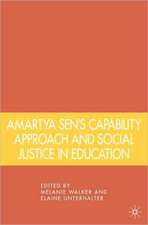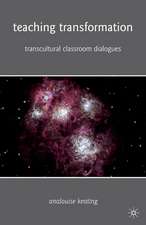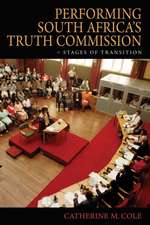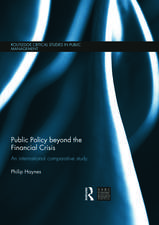Reframing the Problem of Climate Change: From Zero Sum Game to Win-Win Solutions
Autor Klaus Hasselmann, Carlo Jaeger, Gerd Leipold, Diana Mangalagiu, Joan David Tàbaraen Limba Engleză Paperback – 30 noi 2011
At the same time, the book goes beyond providing yet another description of climate change trends and policy processes. Its goal is to make available, in a series of in-depth reflections and insights by key international figures representing science, business, finance and civil society, what is really needed to link knowledge to action. Different contributions convincingly show that it is time – and possible – to reframe the climate debate in a completely new light, perhaps as a system transformative attractor for new green growth, sustainable development, and technological innovation.
Reframing the Problem of Climate Change reflects a deep belief that dealing with climate change does not have to be a zero sum game, with winners and losers. The contributors argue that our societies can learn to respond to the challenge it presents and avoid both human suffering and large scale destruction of ecosystems; and that this does not necessarily require economic sacrifice. Therefore, it is vital reading for students, academics and policy makers involved in the debate surrounding climate change.
| Toate formatele și edițiile | Preț | Express |
|---|---|---|
| Paperback (1) | 329.45 lei 6-8 săpt. | |
| Taylor & Francis – 30 noi 2011 | 329.45 lei 6-8 săpt. | |
| Hardback (1) | 1003.93 lei 6-8 săpt. | |
| Taylor & Francis – 30 noi 2011 | 1003.93 lei 6-8 săpt. |
Preț: 329.45 lei
Preț vechi: 424.19 lei
-22% Nou
Puncte Express: 494
Preț estimativ în valută:
63.04€ • 65.82$ • 52.17£
63.04€ • 65.82$ • 52.17£
Carte tipărită la comandă
Livrare economică 05-19 aprilie
Preluare comenzi: 021 569.72.76
Specificații
ISBN-13: 9781849714488
ISBN-10: 1849714487
Pagini: 272
Ilustrații: 10 black & white tables
Dimensiuni: 156 x 234 x 18 mm
Greutate: 0.43 kg
Ediția:New.
Editura: Taylor & Francis
Colecția Routledge
Locul publicării:Oxford, United Kingdom
ISBN-10: 1849714487
Pagini: 272
Ilustrații: 10 black & white tables
Dimensiuni: 156 x 234 x 18 mm
Greutate: 0.43 kg
Ediția:New.
Editura: Taylor & Francis
Colecția Routledge
Locul publicării:Oxford, United Kingdom
Cuprins
Introduction: Beyond the Zero-sum Game – From Shirking Burdens to Sharing Benefits Part 1: The Status Analysis 1. Uncertainty in Climate Change Projections 2. Climate Impacts: From Numbers to Adaptation Action 3. Reframing Public Opinion on Climate Change Part 2: Overcoming the Zero Sum Game 4. Scarcity and Coordination in the Global Commons 5. Assessing Green Growth: The Case of Europe 6. Putting People at the Heart of the Climate Debate Part 3: Dealing with Complexity – Not Easy, but it Can Be Done 7. The Actor-driven Dynamics of Decarbonization 8. When Futures Lock-in the Present: Towards a new Generation of Climate Scenarios 9. Mainstreaming Low-Carbon Finance 10. Challenges and Opportunities in Financing the Response to Climate Change 11. An Example: Reforestation. Conclusions Action for Climate. Beyond Climate as Zero-sum Game
Notă biografică
Prof. Carlo Jaeger is head of the research domain on Transdisciplinary concepts and methods of the Potsdam Institute of Climate Impact Research, Germany.
Prof. Klaus Hasselmann is founding Director of the Max Planck Institute of Meteorology. Germany.
Dr. Gerd Leipold is a former Director of Green Peace International.
Prof. Diana Mangalagiu teaches at Reims Management School, France and is Associate Professor at the Smith School of Enterprise and Environment, University of Oxford, UK.
Dr. J. David Tabara is a senior researcher at the Institute of Environmental Sciences and Technology of the Autonomous University of Barcelona, Spain.
Prof. Klaus Hasselmann is founding Director of the Max Planck Institute of Meteorology. Germany.
Dr. Gerd Leipold is a former Director of Green Peace International.
Prof. Diana Mangalagiu teaches at Reims Management School, France and is Associate Professor at the Smith School of Enterprise and Environment, University of Oxford, UK.
Dr. J. David Tabara is a senior researcher at the Institute of Environmental Sciences and Technology of the Autonomous University of Barcelona, Spain.
Descriere
This book provides an evaluation of the science and policy debates on climate change and offers a reframing of the challenges they pose, as understood by key international experts and players in the field. Reframing the Problem of Climate Change reflects a deep belief that dealing with climate change does not have to be a zero sum game, with winners and losers. The contributors argue that our societies can learn to respond to the challenge it presents and avoid both human suffering and large scale destruction of ecosystems; and that this does not necessarily require economic sacrifice. Therefore, it is vital reading for students, academics and policy makers involved in the debate surrounding climate change.
















